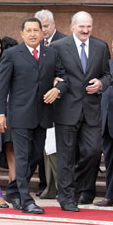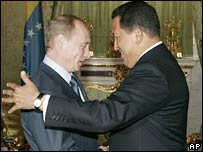Ask people in Caracas what or where Las Cristinas is, and mostly you’ll get blank stares back. It’s a specialist concern, this Las Cristinas thing, with most Venezuelans totally unaware that one of the four or five biggest gold-mines on earth is right here in Southern Bolívar state. Much less have they heard about the titanic 16-year legal saga over control of the mine, or the incredible tales of corruption that emerge when you even scratch the surface on this story.
It really bothers me that the Caracas press doesn’t pay more attention to this issue. It’s kind of understandable, though: After 16 years full of legal battles that have seen just about every player in the saga sue just about every other player at one point or another, the story amounts to a dauntingly complicated, headache inducing web of emnities peppered with incomprehensible technical disputes. So most journalists don’t have the time/energy/concentration/legal know-how/geological know-how to get into it. It doesn’t help that global mining companies are largely perceived as a bunch of aggressively predatory outlaws – the fight between Minca and Crystallex Corporation over the mine was described to me once as “a fight between Al Capone and Don Corleone.” Yowza.
Still, the story itself is delicious, full of weird twist and turns, sworn-political enemies quietely slipping into bed with each other to share the spoils of the deal, every sort of outrageous financial trick and illegal maneuver, tape recordings of Venezuelan politicianss haggling over the price of their support over the phone, American PR firms hired by one partner of the joint-venture to fling mud at the other partner, and people becoming millionaires on the strength of their willingness to play dirtier than the other side. The fun thing is that the information isn’t even hard to get at: a couple of phone calls will produce copious evidence for just about everything in this paragraph.
The extremely stripped down version is that Crystallex Corporation – a small Canadian gold mining company that very much fits the Al Capone school of corporate strategizing – has for years been using an extremely dubious claim to hold legal rights over the mine to pump up their stock prize at the Toronto stock exchange. But while their claim to the mine had been seen as basically laughable by most people who follow the saga, it suddenly became much more serious a couple of months back when the Venezuelan government suddenly decided to unilaterally ended the contract it had signed with a company called Minca (which is actually a partnership between a larger Canadian mining company called Vannessa Ventures and Venezuela’s State-owned regional development corporation, CVG) without even going through the International Arbitration procedures demanded in the contract. Though the procedure to strip Minca of its concession was a juridical travesty, within a couple of months the government had mysteriously turned around and granted the contract to Crystallex, a company that still had open litigation against the government for this very same track of land.
Ever since, Minca has been suing and suing and suing just about everyone involved in the issue ever since, but Crystallex appears to have deep pockets and many friends in high places. A lot of people certainly perceive Minca’s crusade to get the mine back as slightly quixotic and pretty much doomed. Of course, it’s news to no one that Venezuelan government decisions are for sale, and Crystallex is certainly in the business of buying. The contract granted to them after the government inexplicably rescinded Minca’s contract was an incredible give away. Crystallex paid just $15 million for $172 million worth of mining equipment that Minca had built. It’s plainly obvious that Crystallex is too small a company, and too shady, to raise the hundreds of millions of dollars in project financing that it would take to actually develop the mine, so the government’s claim that they’re acting in the interest of getting the mine intor production as soon as possible are an evident sham. Moreover, the government granted that contract while Minca’s claims to the mine were still pending – with three separate suits awaiting judgement at the Supreme Tribunal. Don’t be surprised if you see the magistrates involved start driving shiny new $80,000 Mercs soon.
Still, given the pending arbitration, the $15 million price-tag is probably too much, not too little – it’s hard to see how any serious mining company would have paid any money at all for a mine contract so deeply mired in legal disputes. Still, it’s easy to see that Crystallex is far from interested in actually developing the mine – the game appears to be to use the favorable press-coverage from the new contract to pump up the company’s stock price in Toronto even higher, allowing the well-connected to cash-in bigtime on their Crystallex stock options. A lot of shady Canadians (and Venezuelans) are getting obscenely rich out of this whole thing…including, incredibly, one of President Chávez’s most hated political foes.
Certainly the weirdest part of the whole story, the part I’d love to develop into a nice juicy scandal, is that frikkin’ Enrique Tejera-Paris, the former AD diplomat whose house got raided by the Secret Police a couple of months back, the octogenarian accused by Chávez of leading a fascist conspiracy to topple his government, is knee-deep in the whole affair. As of a month ago, he was still on Crystallex’s board of frikkin’ directors. He apparently got $20 million worth of business for his law firm out of Crystallex, and eight million stock options. There’s a dark story going around that he (or his son, who has the same name) was sent to Bolívar state to physically tamper with the civil registry showing the mine’s ownership. And given the spike in Crystallex’s stock price after the government gave it the new contract, he’s probably pocketed millions of dollars more from the whole putrid deal since.
Which strikes me as a remarkable, almost unbelievable story. The man accussed by Chávez of the most egregious reactionary coupsterism turns out to be in bed with his government on a multi-million dollar corruption scandal! Why oh why is the fucking Caracas press not picking up on this? It drives me slightly batty. I have a sinking suspicion, though this I can’t prove, that Crystallex pays off well-connected newspaper editors here for favorable press coverage. It’s painfully obvious that they pay off at least one newsweekly – Quinto Día – which has been giving them outrageously favorable coverage for days. Rumor has it that Quinto Día actually approached Minca to say, pretty much, that their editorial line could change…for a price. My guess is that that’s part of the explanation, but there’s more to it. The press silence is probably the outcome of a series of interlocking issues: the story is too complicated and/or they see Minca as a lost cause and/or they have this kind of defeatist attitude that treats corruption as a kind of force of nature, unstoppable and therefore not worth fighting, and/or they’re on the take from Crystallex. One way or another, it’s a delicious, juicy scandal that no one’s really going after – I’d love to go after it myself, except nobody reads the damn magazine I write for – and this blog…well, it’s almost as much a “specialist interest” as the Las Cristinas saga is…
|

 Chavez Reelection Blog: Katy documents the government's use of public resources for Chavez's partisan advantage.
Chavez Reelection Blog: Katy documents the government's use of public resources for Chavez's partisan advantage.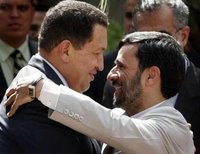

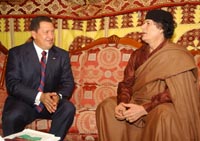

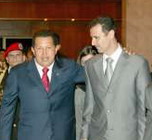
 Site feed
Site feed 